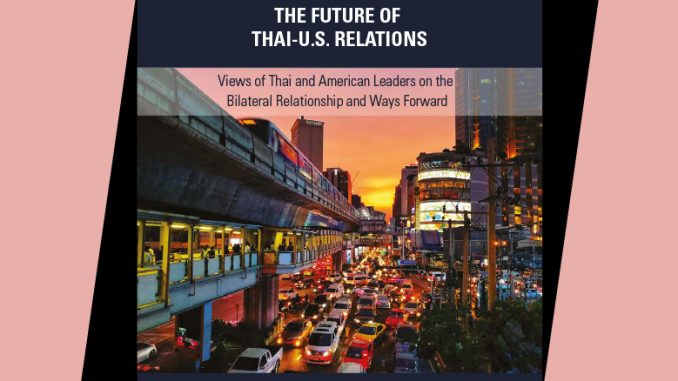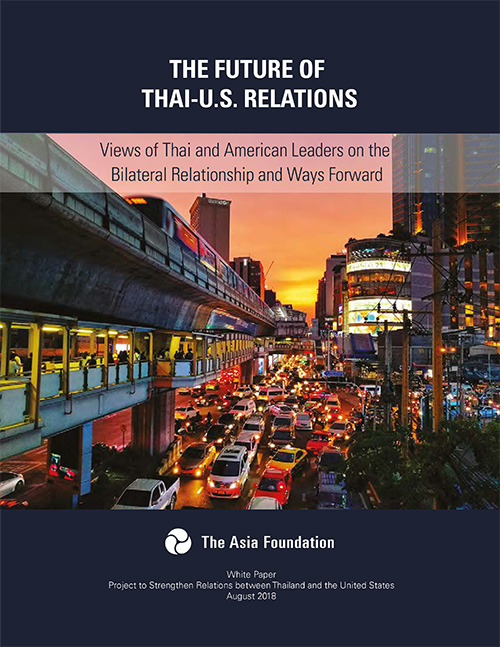
Title: The Future of Thai-U.S. Relations: Views of Thai and American Leaders on the Bilateral Relationship and Ways Forward
Author: The Asia Foundation
Publisher: The Asia Foundation (2018), 45 pages
Are Thailand and the United States still “Good and Great Friends” after all these years? Where is the strategic importance of Thailand in American grand strategy and vice versa? Is there any room to improve deteriorating relations after the two military coup d’états in 2006 and 2014? These queries have preoccupied the minds of many Thai elites and the foreign policy establishments for more than a decade. Drawing on extensive interviews with 50 leaders, as well as a bilateral dialogue between Thai and American delegations, the Asia Foundation report, co-authored by Thomas Parks and Benjamin Zawacki, offers a detailed, albeit optimistic, review on the current relationship between Thailand and the United States.
Contrary to conventional wisdom that the ties between Thailand and the United States have recently gone sour, this report argues instead that the Thai-U.S. partnership have already emerged from “a low point”. In other words, “after a few challenging years,” the report asserts, “the bilateral relationship between the United States and Thailand is showing clear signs of improvement”. One of the biggest contributions of this work is an attempt to find “new opportunities” to recalibrate the bilateral relations amid changing geopolitical context. In recent years, the range of an all-compassing partnership between Bangkok and Washington is extraordinarily long: the 2017 senior-levels visits, the Great and Good Friends commemoration of 200 years of Thai-U.S. relations, the resume of Cobra Gold joint military exercise, the American involvement in Mekong region, but the fact that Thailand is drifting away from the American orbit cannot be obscured. According to a former U.S. Senator, “Thailand has gone off the radar completely in the United States. You don’t read much about Thailand in the Wall Street Journal, the New York Times, the Washington Post, and the Economist. If something strategic is going on in Thailand right now, it’s under the radar.” In similar fashion, former U.S. Ambassador to Thailand Eric G. John points out that, “since the end of the Cold War, the relationship has been on autopilot with neither nation putting forth a lot of effort, a kind of drift into irrelevance for both sides.”
Following the wake of a renewed great-power competition, Thailand, according to the report, “has clearly pivoted toward China”. While in Thailand: Shifting Ground Between the US and a Rising China (2017), the author posed an intriguing question on how the United States could win Thailand back from embracing the rising China, 1 the more important question is: Does Thailand still relevant in American foreign policy playbook since Thailand is no longer share strategic interest with the United States? If not, why does the world’s most powerful country still have to invest its time and resources to “win” Thailand back?
Asia-Pacific or Indo-Pacific, a terminology popularized by the Trump administration, does not just only contribute more than two-thirds of global economic growth, but also remains a key strategic priority to major powers. It comes as no surprise if the American foreign policy establishment has chosen to steer the path of U.S. foreign policy to the new direction as demonstrated by Obama’s Rebalancing Act and Trump’s Freedom and Open Indo-Pacific Strategy. As China’s growing influence in the region has been viewed as a potent threat to the American sphere of influence, the United States must, once again, pull of containment policy to counterbalance China. In doing so, the United States has to rely on its allies. The United States fully supported Thailand’s chairmanship of ASEAN in 2019, expecting the country to play a leading role within the regional body, particularly when it comes to China’s behavior, which is often interpreted as “a source of division within ASEAN”. As the ASEAN Chair, Thailand was, however, unable to play such a role. On several occasions, Thailand, as Zachary Abuza puts it, “has worked to downplay tensions in the South China Sea that have pitted Vietnam, the Philippines, and Malaysia against China”. 2

While Thailand could not live up to America’s expectation, the credibility and commitment of the United States have also been called into a question as the United States has failed to be a reliable partner to Thailand. A prominent Thai scholar observes that, “China plays a long game and so will achieve its objectives slowly; the U.S. changes target every time it changes president”. A prime example of this sentiment can be found in the case of the Mekong River. According to the report, the Mekong River is regarded as “an issue of shared strategic interest for the U.S. and Thailand,” but the United States, at that moment, did not consider the importance of the Mekong River on the same level as Thailand.
As the great-power rivalry has become “a fact of life” 3 in Indo-Pacific, Thailand, in the words of the Bangkok elites, “should be to carefully balance major power, and avoid taking sides”. Thailand does not perceive China as a threat; rather, it does not hesitate to reap benefits from the rising power despite the risk of falling into China’s “web of dependency”. Even in military affairs where it is considered as the strongest aspects of the U.S. and Thai relations, Thai military officers believe that China’s influence “has caught up with and passed that of the United States”. Hence, the relevance and usefulness of Cobra Gold joint exercises as well as the U.S. International Military Education and Training (IMET) program should thoroughly reassessed.
An in-sight and fair analysis of Thai-U.S. partnership asides, internal political divisions in Thailand seem to be intentionally neglected. Evidently, the Thai monarch and Thai military have been key factors in destabilizing democratic consolidation in the Kingdom, it is therefore inconceivable when the most important topics are rarely addressed or left out from the study. It should be noted that the use of Thailand’s strict lèse majesté law has been heavily criticized by the international organizations, and, of course, the United States. In 2015, Former U.S. Ambassador to Thailand Glyn T. Davies gave a speech condemning the use of draconian royal defamation law against political activists, which triggered an anti-American sentiment among Bangkok elites and many Thais who worshipped the late King Bhumibol. Without a doubt, the primary objective of this report is to identify “a shared vision for a recalibrated U.S.-Thailand relationship”, but the ties will not be lasting until the leaders of both countries agree that democracy is the only game in town. Unexpectedly, one of the key recommendations of this work is – the United States should promote democracy and the rule of law with more sensitivity to local context and avoid actions that could be perceived as interference in Thai politics.” This line of policy recommendation alone reflects that the selection criteria for the key informants are problematic. Although the book’s subtitle – “views of Thai and American leaders on the bilateral relationship and ways forward” – may explicitly state that it will concentrate primarily on the “leaders” who have shaped the bilateral relations, but in this study, only the Thai conservatives and elites are handpicked to represent Thailand’s voices, while progressive leaders and activists holding different views have not been included. Based on the findings and key recommendations of the Asian Foundation report, it is worth noting that the culture of academic elitism in Thai society, dominating the discourse and setting the foreign policy agenda, is here to stay.
In conclusion, the future of Thai-U.S. relations appears to be dismal as Thailand’s geopolitical significance and regional leadership have declined over time, combined with the fact that Thailand no longer shares strategic interest with the United States, while the United States cannot be seen as a reliable partner. Accordingly, the conviction that both countries can find ways to rekindle and recalibrate their moribund relations should be deemed as a great delusion.
Reviewed by Thapiporn Suporn
Thapiporn Suporn teaches International Affairs at Khon Kaen University International College (KKUIC), Khon Kaen, Thailand. He can be reached at thapiporn@gmail.com
Notes:
- Benjamin Zawacki, Thailand: Shifting Ground between the Us and a Rising China (London: : Zed Books Ltd., 2017). ↩
- Zachary Abuza, “America Should Be Realistic About Its Alliance with Thailand,” War on the Rocks, https://warontherocks.com/2020/01/america-should-be-realistic-about-its-alliance-with-thailand/. ↩
- Everlyn Goh, “The Asia Pacific’s “Age of Uncertainty”: Great Power Competition, Globalisation and the Economic-Security Nexus,” ed. S. Rajaratnam School of International Studies (RSIS) (2020), 3. ↩
